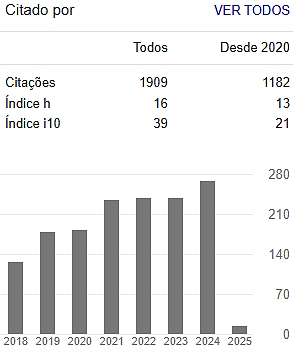INTELIGÊNCIA ARTIFICIAL FRENTE A RESOLUÇÃO DE EXERCÍCIOS DE QUÍMICA: UM ESTUDO EXPLORATÓRIO COM O CHATGPT
Palavras-chave:
Assistentes virtuais, Cálculos estequiométricosResumo
As novas formas de Inteligência Artificial vêm ganhando cada vez mais espaço na escola e entre os alunos. Destaca-se o ChatGPT pelo uso fácil e, no Ensino de Química, essa ferramenta tem se destacado pelas inúmeras possibilidades propagandeadas, entre elas a resolução de exercícios. Contudo, ainda não há 100% de certeza na efetividade de tal instrumento. Este trabalho tem como objetivo investigar o potencial e capacidade do ChatGPT em resolver exercícios de Química envolvendo cálculos estequiométricos e balanceamento de equações. Esses exercícios foram retirados de um livro didático da 2ª série do Ensino Médio bastante utilizado pelos professores da rede básica e aprovado no PNLD. Devido ao cunho da pesquisa ser exploratório, foram selecionadas quatro questões, duas mais simples e duas mais trabalhosas e complexas. Além disso, no caso do ChatGPT apresentar o resultado de maneira errada, realizou-se alguns testes para analisar se uma mudança no enunciado geraria também mudança nos resultados. Estes, por sinal, revelam que o chat sobressai-se na linguagem utilizada, pois é simples e de fácil entendimento. Em contrapartida, decepciona resolvendo problemas de estequiometria pois, por exemplo, ele confunde conceitos e não considera todos os átomos ao balancear uma equação. Ou seja, ao menos que ela já esteja balanceada corretamente, não é aconselhável o uso do ChatGPT para resoluções de exercícios deste tipo e apesar de ser uma ferramenta promissora e com algumas qualidades, não é indicada para aqueles que não possuem o conhecimento completo e/ou um discernimento necessário para detectar os erros cometidos e corrigi-los.
Downloads
Referências
ANDERS, Brent. ChatGPT AI in Education What it is and How to Use it in the Classroom. Canadá: Sovorel, 2023.
ARAYA, Ana Maria Osório; GIBIN, Gustavo Bizarria; SOUZA FILHO, Moacir Pereira de. Uma introdução às Tecnologias Digitais de Informação e Comunicação no ensino de Ciências. In: ARAYA, Ana Maria Osório; GIBIN, Gustavo Bizarria; SOUZA FILHO, Moacir Pereira de (orgs.). O ensino de Ciências e as Tecnologias Digitais da Informação e Comunicação (TDIC): pesquisas desenvolvidas na educação básica. São Paulo: Editora Unesp, 2021. Disponível em: https://books.scielo.org/id/cwcpz. Acesso em: 09 nov. 2023.
BROWN, Christian. ChatGPT prompts mastering: a guide to mastering effective prompts. United States of America: First Printing Edition, 2023.
CLARK, Ted M. Investigating the Use of an Artificial Intelligence Chatbot with General Chemistry Exam Questions. Journal Of Chemical Education, Washington, v. 100, n. 5, p. 1905-1916, 2023. Disponível em: https://pubs.acs.org/doi/epdf/10.1021/acs.jchemed.3c00027. Acesso em: 20 jul. 2023.
COSTA JÚNIOR, João Fernando; LIMA, Uilliane Faustino de; LEME, Mário Domingos; MORAES, Leonardo Silva; COSTA, Jonas Bezerra da; BARROS, Diogo Magalhães de; AMORIM, Maria Aparecida de Moura Amorim; OLIVEIRA, Luis Carlos Ferreira de. A inteligência artificial como ferramenta de apoio no ensino superior. Revista Brasileira de Ensino e Aprendizagem, Rio Largo, v. 6, p. 246-269, 2023. Disponível em: https://rebena.emnuvens.com.br/revista/article/view/111/101. Acesso em: 20 jul. 2023.
EMENIKE, Mary E.; EMENIKE, Bright U. Was This Title Generated by ChatGPT?: considerations for artificial intelligence text-generation software programs for chemists and chemistry educators. Journal of Chemical Education, Washington, v. 100, n. 4, p. 1413-1418, 2023. Disponível em: https://pubs.acs.org/doi/10.1021/acs.jchemed.3c00063. Acesso em: 24 jul. 2023.
EXINTARIS, Betty; KARUNARATNE, Nilushi; YURIEV, Elizabeth. Metacognition and critical thinking: using ChatGPT-Generated Responses as Prompts for critique in a problem-solving workshop (SMARTCHEMPer). Journal of Chemical Education, Washington, v. 100, n. 8, p. 2972-2980, 2023. Disponível em: https://pubs.acs.org/doi/10.1021/acs.jchemed.3c00481. Acesso em: 25 jul. 2023.
FERGUS, Suzanne; BOTHA, Michelle; OSTOVAR, Mehrnoosh. Evaluating academic answers generated using ChatGPT. Journal of Chemical Education, Washington, v. 100, n. 4, p. 1672-1675, 2023. Disponível em: https://pubs.acs.org/doi/10.1021/acs.jchemed.3c00087. Acesso em: 25 jul. 2023.
GUIMARÃES, Ueudison Alves; BRANDÃO, Conceição Aparecida; DAITX, Mariele Apolinário; DUTRA, Anne Frank Gomes de Arruda; LOPES, Vanessa Robbi Bubula. As mídias digitais no campo educacional: um olhar pelas aplicações do chat GPT na educação. Revista Científica Multidisciplinar, Jundiaí, v. 4, n. 7, p. e473556-e473556, 2023. Disponível em: https://recima21.com.br/index.php/recima21/article/view/3556. Acesso em: 18 jul. 2023.
HUMPHRY, Tim; FULLER, Amy L. Potencial ChatGPT use in undergraduate chemistry laboratories. Journal of Chemical Education, Washington, v. 100, n. 4, p. 1434-1436, 2023. Disponível em: https://pubs.acs.org/doi/10.1021/acs.jchemed.3c00006. Acesso em: 24 jul. 2023.
JOHN, Ibrahim. The art of asking ChatGPT for high-quality answers: a complete guide to prompt engineering techniques. United States of America: Zunda Technologies Limited, 2023.
LEITE, Bruno Silva. Tecnologias no ensino de química: passado, presente e futuro. Scientia Naturalis, Rio Branco, v. 1, n. 3, 2019. Disponível em: https://periodicos.ufac.br/index.php/SciNat/article/view/2570/1476. Acesso em: 20 jul. 2023.
LÜDKE, Menga; ANDRÉ, Marli. Pesquisa em educação: abordagens qualitativas. Rio de Janeiro: E.P.U., 2018.
MORAN, José. A educação que desejamos: novos desafios e como chegar lá. 5. ed. Campinas: Papirus, 2012.
MORAN, José. Ensino e aprendizagem inovadores com apoio de tecnologias. In: MORAN, José; MASETTO, Marcos; BAHRENS, Marilda Aparecida (orgs.). Novas tecnologias e mediação pedagógica. Campinas: Papirus, 2013.
PAULETTI, Fabiana; MENDES, Michel; ROSA, Marcelo Prado Amaral; CATELLI, Francisco. Ensino de química mediado por tecnologias digitais: o que pensam os professores brasileiros? Revista Interacções, Santarém, v. 13, n. 44, 2017. Disponível em: https://revistas.rcaap.pt/interaccoes/article/view/9820. Acesso em: 18 jul. 2023.
REIS, Martha. Química. São Paulo: Ática, 2016.
SAMPIERI, Roberto Hernandez; COLLADO, Carlos Fernández; LUCIO, María del PilarBaptista. Metodologia de pesquisa. Porto Alegre: Penso, 2013.
TYSON, Julian. Shortcomings of ChatGPT. Journal of Chemical Education, Washington, v. 100, n. 8, p. 3098-3101, 2023. Disponível em: https://pubs.acs.org/doi/10.1021/acs.jchemed.3c00361. Acesso em: 24 jul. 2023.
ZAWACKI-RICHTER, Olaf; MARÍN, Victoria I.; BOND, Melissa; GOUVERNEUR, Franziska. Systematic review of research on artificial intelligence applications in higher education - where are the educators? International Journal of Educational Technology in Higher Education, v. 16, n. 1, p. 1-7, 2019. Disponível em: https://educationaltechnologyjournal.springeropen.com/articles/10.1186/s41239-019-0171-0. Acesso em: 19 jul. 2023.

